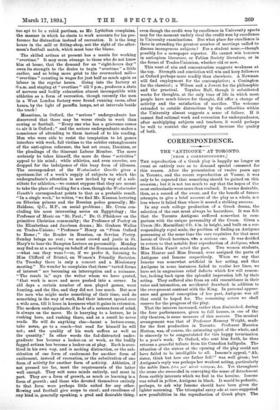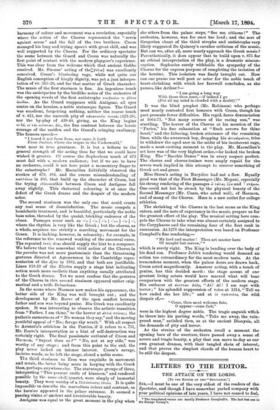CORRESPONDENCE.
THE " ANTIGONE " AT TORONTO.
FROM A CORRESPONDENT.] THE reproduction of a Greek play is happily no longer an event so entirely rare as to demand special comment for this reason. After the presentation of twelve years ago in Toronto, and the recent reproduction at Vassar, it was only to be expected that something should be gained on this occasion ; but it is not too mach to say that the hopes of the most enthusiastic were more than realised. It seems desirable, then, as a record of the event, and for the benefit of future attempts, to give a brief account of the play as a whole, not less where it failed than where it scored a striking success.
In any such college production of a Greek drama, the selection of the cast must always be hazardous. It was felt that the Toronto Antigone suffered somewhat in com- parison with the unique personality of the Creon. Given a Creon (Mr. Macmillan) 6 ft. 4 in. in height, and built on a cor- respondingly royal scale, the problem of finding an Antigone possessing at the same time the rare requisites for that most heroic of Greek heroines, wits a serious one. It was decided to return to that notable first reproduction of Antigone, when Miss Helen Faucit acted the part. Two women students, Miss Hunter and Miss Durand, were assigned the parts of Antigone and Ismene respectively. When we say that Ismene was somewhat artificial in her acting, and that Antigone in some instances failed to realise her lines, we have set in ungracious relief defects which few will remem- ber, looking back upon the splendid impression left by their acting. They suffered also from an odd resemblance in their voice and intonation, an accidental drawback in addition to the ever-present contrast with the King. In personal appear. ance and general conception of her part, Antigone was all that could be hoped for. The remaining actors we shall reserve for the progress of the play.
That the interest increased, rather than diminished, during the four performances, given to full houses, in one of the city theatres, is some measure of this success. The musical arrangement was that of Professor Ramsay Wright, made for the first production in Toronto. Professor Maurice Hutton, was, of course, the animating spirit of the whole, and is sincerely to be congratulated for this happy termination to a year's work. To Oxford, who sent him forth, he thus returns a graceful tribute from his Canadian kallipolis. The situation of the sisters at the opening of the play could not have failed to be intelligible to all. Ismene's appeal, " Ah, sister, think but how our father fell !" was well given ; but Antigone's reply was perhaps her weakest acting, particularly
Fri in-oi; >Cat:MIAMI, the noble lines, Om &Lc. Yet throughout
the scene she succeeded in conveying the sense of detachment from earthly interests which we feel in the heroine. Ismene was robed in yellow, Antigone in black. It would be pedantic, perhaps, to ask why Ismene should have been given the lighter mourning. The triumphal entry ode at once suggested new possibilities in the reproduction of Greek plays. The
harmony of colour and movement was a revelation, especially where the action of the Chorus represented the " seven against seven" and the fall of the two brothers. Creon managed his long and trying speech with great skill, and was well supported by the Chorus. For the ordinary spectator the scene between the Guard and Creon was naturally the first point of contact with the modern playgoer's experience. This was clear from the welcome which that ancient Gobbo received. Mr. Sissons' acting of the:00twf, was excellently conceived. Creon's blustering rage, while not quite our English conception of kingly dignity, was yet a just interpre- tation of vv. 315-26, and for that matter of Greek character. The music of the first stasimon is fine. An ingenious touch was the anticipation by the birdlike notes of the orchestra of the opening words of the first antistrophe xotlovde.ni Oprithoy. As the Guard reappears with Antigone, all eyes centre on the heroine, a noble statuesque figure. The Guard was excellent, forgetting nothing, neither the coarse touch of v. 412, nor the uncouth pity of zipaxancZer froepeic (423-28), nor the by-play of 439-40, giving, as the King begins &e., the fine contrast between the heroic courage of the maiden and the Guard's cringing exultancy. The famous speech— "I heard it not from Zeus, nor came it forth
From Justice, where she reigns in the Underworld,"
went near to true greatness. It is but a tribute to the general strength of the acting thus far that we could have wished it greater. Of course the Sophoclean touch of 473 must fail with a modern audience ; but if we are to have an orchestra, could it not here point a momentary finger to the catastrophe ? Mr. Macmillan faithfully observed the strokes of 479, 484, and the coarse misunderstanding of aaro;sris in 496, that build up the character of Creon, but the trying eticomuthia between Creon and Antigone fell away slightly. This rhetorical colouring is at once the defect of the Greek drama and the despair of the modern actor.
The second stasimon was the only one that could create any real sense of dissatisfaction. The music compels a hemichoric treatment, and is beautiful, particularly the noble bass solos, threaded by the quaint, trickling cadences of the oboes. Passages recur such as Ja I -"a I -fc, —'1./O I —'u I where the rhythm is very like the Greek ; but the chorus, as a whole, acquires too strictly a marching movement for the Greek. It is lacking. however, in solemnity; for example, in the reference to the renewed working of the ancestral curse. The repeated bcrO; shag should supply the hint to a composer. We believe that the somewhat vivid action of the Chorus in the parodos was not more pantomimic than the threatening gestures directed at Agamemnon in the Cambridge repre- sentation of the Ajax in 1882, and that both are justifiable. Lines 818-19 of the Electra supply a stage hint indicating action much more realistic than anything usually attributed to the Greek drama. Yet we must confess that the gestures of the Chorus in this second stasimon appeared rather enig- matical and a trifle Delsartean.
In the scene where Haemon now makes his appearance, the better side of the King was well brought out ; and the development by Mr. Reeve of the open conflict between father and son was beyond praise. His Greek was excellently spoken. It was interesting to observe the artistic transition from "Father, I am thine," to the horror at ciroui vsr6ax;; the pathetic earnestness of " No woman they say," and the moving youthful appeal of " No ; forego thy wrath." With all respect to Aristotle's criticism in the Poetics, if it refers to v. 751, Mr. Reeve's interpretation as a hint of self-destruction was certainly right. The final passionate outburst of Creon and Haemon, " Sayest thou so ? " "No, not at my side," was worthy of any stage ; and from this point to the end, the play never lacked an intense interest. Creon's savage, incisive words, as be left the stage, closed a noble scene.
Tie third stasimon to Eros was exquisite in movement and music, the latter being more in keeping with the Greek than, perhaps, anywhere else. The statuesque groups of three, interpreting " This present strife of kinsmen," and rendered
possible by the concealed were simply of immortal beauty. They were worthy of a liox6amti-el ivoier. It is quite impossible to describe the marvellous colour and contrast, as the heroine appeared in the palace entrance. It seemed a passing vision 01 ancient and irretrievable beauty.
Antigone was equal to the great moment in the play when
she utters from the palace steps, "See me, citizens !" The- orchestra, however, was for once too loud ; and the sort of Gregorian chant of the third strophe and antistrophe very likely suggested De Quincey's cavalier criticism of the music.. But can we, after all, more nearly approach the Greek music P Parenthetically, it does appear that to build upon v. 875 for- an ethical interpretation of the play, is a dramatic miscon- ception. Sopbocles surely withholds the sympathy of the Chorus for the express purpose of completing the isolation of the heroine. This isolation was finely brought out. How can one praise too well poet or actor for the noble touch of heart-shrinking with which her farewell concludes, as she- pauses, like Arthur ?-
" I am going a long way With those thou seest,—if indeed I go (For all my mind is clouded with a doubt) !"
It was the blind prophet (Mr. Robinson) who perhaps. most nearly contested first honours with Creon, though hits part presents fewer difficulties. His rapid, fierce denunciation at 1064-71, "Not many courses of the racing sun," was- startling. The horror of the Chorus at his mention of the " Furies," his fine exhaustion at " Such arrows for thine-
heart," and the faltering, broken utterance of the remaining lines, while the awestruck boy, dropping his cirri- picyaraw, tries- to withdraw the aged seer in the midst of his incoherent rage,. made a most exciting moment in the play. Mr. Macmillan's- art here was of the very highest order,—he looked the broken- King. The " Bacchic Dance" was in every respect perfect. The chorus and chorus-trainer were amply repaid for the- severe work implied in this attempt to recover something of Greek art and grace.
Miss Steen's acting in Eurydice had not a flaw. Equally good was that of the First Messenger (Mr. Megan), especially his strong rendering of the passages •rciAccg iV■eu and 1- Trtipos. One could not but be struck by the physical beauty of the- Second Messenger (Mr. Coats, who acted well), of Haemon, and of many of the Chorus. Here is a new outlet for college-
athletics.
The shrinking of the Chorus in the last scene as the King enters, and the note of expectancy in the music, prepare us for greatest effort of the play. The musical setting here com- pels the Chorus to take what was almost certainly assigned to- the Coryphaeus and the remaining four of the first rank in succession. At 1278 the interpretation was based on Professor- Campbell's fine rendering,- " My lord and master ! Thou art master here Of naught but sorrow," *
which is surely right. The King is bending over the body of his dead son. Professor Jebb's rendering would demand en- action too extraordinary for the most modern taste. At the- tremendous moment, when the palace doors are drawn back, Creon acted magnificently. Amateur acting, with a touch or genius, has this decided merit : the stage accent of our living actors would have marred what will bear comparison with the greatest efforts of the modern stage._ His outburst at elyi.vram Ni3v, "Al! Al! I am rapt with- terror ; " his splendid suppression of voice at 1314, " Tell us.: how ended she her life ; " and at 141 7Tpee 7:0X04 the wild., despair of,—
"Come, thou most welcome fate, 0 appear—come fast,"
were in the highest degree noble. The tragic anguish wlfich, he threw into his parting words, " Take me away, the vain-
proud man," satisfied then, as at the ancient Dionysia, all the demands of pity and terror.
As the strains of the orchestra recall a moment the- opening bars of the overture, there passed away a scene of severe and tragic beauty, a play that can move to-day as our own greatest dramas, with their tangled skein of interest,.
and that proves the simplest chords of the human heart to be still the deepest.



































 Previous page
Previous page